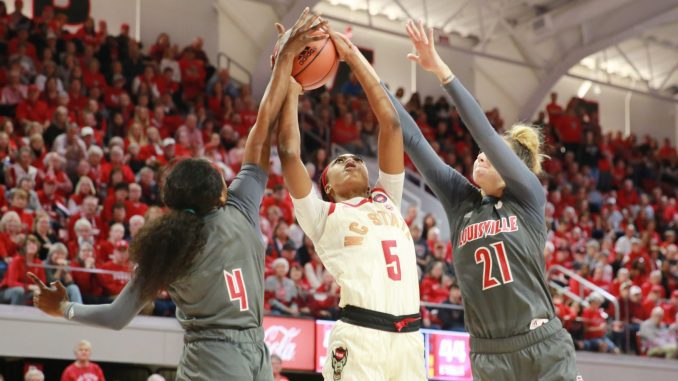
RALEIGH — On the day his team was elevated to the No. 4 national ranking last week, ahead of perennial power UConn and in position to claim one of the four top seeds in the upcoming NCAA Tournament, NC State women’s basketball coach Wes Moore gathered his players to deliver a message.
“They don’t hand out trophies in February,” he said. “We’ve got to just keep trying to get better.”
It sounded like a tired old coaching cliché at the time. It turned out to be a warning.
One the Wolfpack didn’t heed.
Instead of putting a stranglehold on the ACC race and all but clinching its first regular season conference title since 1990, NC State fell back into a first-place tie with Louisville after a 66-59 loss to the ninth-ranked Cardinals in a top-10 showdown at Reynolds Coliseum.
State then compounded that setback by dropping a 65-61 decision to Georgia Tech on Sunday before a second straight home sellout crowd.
As disappointed as Moore was with the results, the veteran coach said he’s even more troubled by the way they came about — suggesting that his team didn’t do a good job of handling its first experience on the national stage.
“I think teams are just coming in here and they’re hungry,” he said. “You’ve got Louisville coming in here and they’re fighting for first place. Georgia Tech is on the bubble trying to earn a big win that will help their resume. I feel like we’re just not matching that energy and intensity like we need to be.”
That was the case early in the Louisville game as the more seasoned Cardinals knocked State back and quieted the festive crowd with an early 12-0 run.
The Wolfpack managed to play even with its opponent the rest of the way.

But with star center Elissa Cunane being pushed around physically by Louisville’s shot-blocking behemoth Kylee Shook on the way to a 1 of 12 shooting performance and usually reliable sharpshooter Aislinn Konig missing all six of her 3-point attempts, State was never able to get closer than three points.
“All night long we were trying to dig ourselves out of a hole,” Moore said. “I thought we took some bad shots in the first quarter in particular, forced some things. Maybe we were a little nervous, but we weren’t in attacking mode.”
Though the outcome was the same, the circumstances were reversed against Georgia Tech.
State got off to a solid start, leading 30-25 at halftime with Cunane on her way to a more representative 17 points. But the Wolfpack was outscored 26-15 in the third quarter — a period it has traditionally dominated this season — and never recovered.
Again, perimeter shooting was a problem.
After going just 5 of 20 from 3-point range against Louisville, State was 3 of 13 in the loss to the Yellow Jackets. By contrast, Tech’s Francesca Pan went 4 of 9 from distance all by herself, finishing the game with 30 points to lead the upset.
“We’re really struggling to score the ball on the perimeter,” Moore said. “I’ve got to look at what we’re doing there. Is there anything I can do to help them?
“But I also look at the other end and I see Georgia Tech really running their stuff hard, setting good picks, using picks. We’re not doing as good a job as that. I’ve got to look at it myself and also look at personnel a little bit. Do we need to be trying some other options?”
The good news for Moore and his team is that, as the coach said last week, they don’t hand out trophies in February. There’s still time to find the answers to those questions, make adjustments — both in schemes and attitude — and make this the special season it started out to be.
Though the ACC regular season championship and top seed in the upcoming conference tournament are likely out of reach — trailing Louisville by a game and the head-to-head tiebreaker with four games remaining — the Wolfpack still has the talent and opportunity to make a deep run in the NCAA Tournament.
“I think we’ve got to bring a little more intensity and play harder,” Moore said. “Offensively, we’ve got to figure out what’s going on to get our guards some open looks. Right now, all of our scoring is coming from the post. We’ve got to figure it out.
“Like I said, whatever is there, we’ll look at it and see if we can figure it out to get a little bit more production out of it.”



